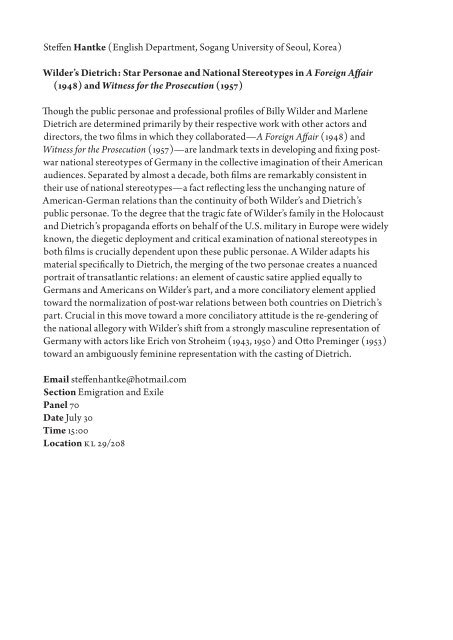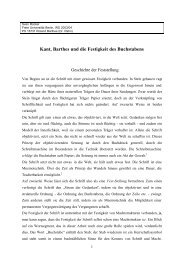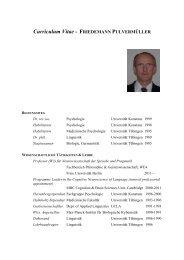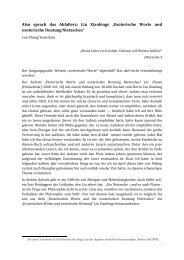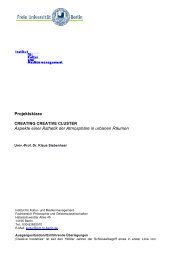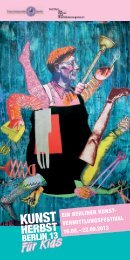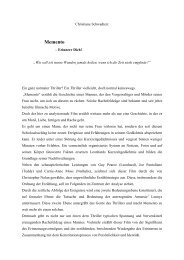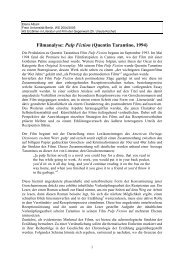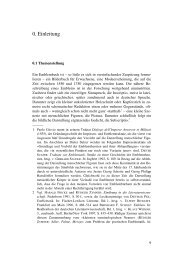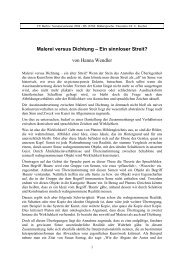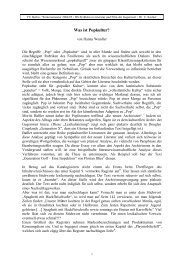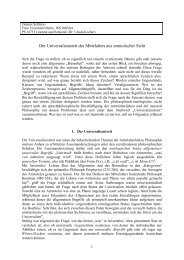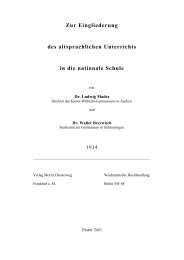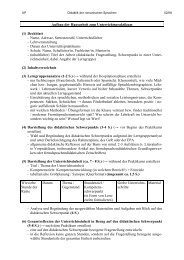- Page 1 and 2:
Ester Nelly Abuter Ananías ( Unive
- Page 3 and 4:
Javier Aldeco, José Hernández-Té
- Page 5 and 6:
Gerardo Álvarez ( Karl-Franzens-Un
- Page 7 and 8:
Reinhard Andress ( Saint Louis Univ
- Page 9 and 10:
Richard Apgar ( University of North
- Page 11 and 12:
Begoña Arteta ( Universidad Autón
- Page 13 and 14:
Ana Beatriz Barel ( Université de
- Page 15 and 16:
José Carlos Barreiro ( State Unive
- Page 17 and 18:
Pilar Baumeister ( Verband deutsche
- Page 19 and 20:
Jens Baumgarten ( Universidade Fede
- Page 21 and 22:
Tânia Beisl Ramos, Madalena Cunha
- Page 23 and 24:
Carmen Benítez ( Universidad Centr
- Page 25 and 26:
Robert Bieder ( Indiana University,
- Page 27 and 28:
Jutt a Birmele ( California State U
- Page 29 and 30:
Hamidreza Bohlouli Zanjani ( Univer
- Page 31 and 32:
Willi Bolle ( Universidade de São
- Page 33 and 34:
Cristian Borges ( Universidade de S
- Page 35 and 36:
Birgit Braasch ( Leeds Metropolitan
- Page 37 and 38:
Markus Breuning ( Bern, Switzerland
- Page 39 and 40:
Lilianet Brintrup ( Humboldt State
- Page 41 and 42:
Benjamin Bryce ( York University, H
- Page 43 and 44:
Vesselin Budakov ( University of So
- Page 45 and 46:
Jelena Bulic ( Croatian Institute o
- Page 47 and 48:
Robert Bye, Th omas Janota ( Univer
- Page 49 and 50:
Isabela Candeloro Campoi ( Freie Un
- Page 51 and 52:
Ernesto Capello ( Macalester Colleg
- Page 53 and 54:
Laura Cázares Hernández ( Univers
- Page 55 and 56:
Anthony Chiaviello ( University of
- Page 57 and 58:
Clara Cisneros Michel ( Universidad
- Page 59 and 60:
Rex Clark ( University of Kansas, G
- Page 61 and 62:
Renato Cordeiro Gomes ( Pontifícia
- Page 63 and 64:
Sergio Corrado ( Università di Nap
- Page 65 and 66:
Jennifer Croft ( Northwestern Unive
- Page 67 and 68: Madalena Cunha Matos ( Universidade
- Page 69 and 70: Geishel Curiel Martinez ( Universid
- Page 71 and 72: Veronica Davidov ( Maastricht Unive
- Page 73 and 74: Samuel De Jesus ( Université Paris
- Page 75 and 76: Antonio de Murcia Conesa ( Teoría
- Page 77 and 78: Fermín Del Pino-Díaz ( Centro de
- Page 79 and 80: Daria Deraga ( Instituto Nacional d
- Page 81 and 82: Tânia Dias ( Fundação Casa de Ru
- Page 83 and 84: Detlev Doherr ( Hochschule für Wir
- Page 85 and 86: Julia Domínguez-Castellano ( Iowa
- Page 87 and 88: Costinela Dragan ( University of Bu
- Page 89 and 90: Eve Duff y ( University of North Ca
- Page 91 and 92: Rachel Esteves Lima ( Universidade
- Page 93 and 94: Priscila Faulhaber-Barbosa ( Museu
- Page 95 and 96: Rodolfo Fernández ( Institutio Nac
- Page 97 and 98: Justus Fetscher ( Zentrum für Lite
- Page 99 and 100: Raquel Franklin ( Universidad Anáh
- Page 101 and 102: Helmut Galle ( Universidade de São
- Page 103 and 104: Chad Gasta ( Iowa State University,
- Page 105 and 106: Louis Gerdelan ( University of Auck
- Page 107 and 108: Josefi na Gómez-Mendoza, Concepci
- Page 109 and 110: Adriana González Mateos ( Universi
- Page 111 and 112: Florian Gräfe ( Universidad de Gua
- Page 113 and 114: Erik Grimmer-Solem ( Wesleyan Unive
- Page 115 and 116: Alberto Guaraldo ( Università di T
- Page 117: Martin A. Hainz ( Universität Wien
- Page 121 and 122: Isabel Hernández ( Universidad Com
- Page 123 and 124: Judith Hernández Aranda ( Institut
- Page 125 and 126: Adrian Herrera Fuentes ( Rheinische
- Page 127 and 128: Ernest W.B. Hess-Lütt ich ( Univer
- Page 129 and 130: E. Walter Hoefl er Ebers ( Universi
- Page 131 and 132: Dirk Hoff mann ( Bolivian Mountain
- Page 133 and 134: Lee Wallace Holt ( Ruprecht-Karls-U
- Page 135 and 136: Roberto Hozven ( Pontifi cia Univer
- Page 137 and 138: Margaret-Anne Hutt on ( St Andrews
- Page 139 and 140: Judith Irwin-Mulcahy ( Wake Forest
- Page 141 and 142: Rolf-Peter Janz ( Freie Universitä
- Page 143 and 144: Miriam Junghans ( Fiocruz Casa de O
- Page 145 and 146: Sascha Keilholz ( Universität Rege
- Page 147 and 148: Tanja Kersting ( Freie Universität
- Page 149 and 150: Youn Sin Kim ( Humanities Research
- Page 151 and 152: Kay LaBahn Clark ( Humboldt State U
- Page 153 and 154: Markus Lasch ( Universidade Federal
- Page 155 and 156: Elodie Laügt ( St. Andrews Univers
- Page 157 and 158: Susanne Leeb ( FU Berlin, Sonderfor
- Page 159 and 160: Ana María Liberali ( Universidad N
- Page 161 and 162: Dirck Linck ( Freie Universität Be
- Page 163 and 164: Helga Lindorf ( Universidad Central
- Page 165 and 166: José Lira ( University of São Pau
- Page 167 and 168: Laura López Morales ( Universidad
- Page 169 and 170:
Alicia Lubowski ( New York Universi
- Page 171 and 172:
Karin Lundberg, Zvi Ostrin ( Hostos
- Page 173 and 174:
Olga Maiorova ( University of Michi
- Page 175 and 176:
Kathleen March ( University of Main
- Page 177 and 178:
Maria Trinidad Marín Villora ( Lud
- Page 179 and 180:
Benjamin Marschke ( Humboldt State
- Page 181 and 182:
Alison E. Martin ( Martin-Luther-Un
- Page 183 and 184:
Marina Martínez Andrade ( Universi
- Page 185 and 186:
Joanna Mazurska ( Vanderbilt Univer
- Page 187 and 188:
Gabrijela Mecky Zaragoza ( México
- Page 189 and 190:
Maria Elena Mena, Maria Elena Pubil
- Page 191 and 192:
Annerose Menninger ( Universität H
- Page 193 and 194:
Tabea Metzel (Freie Universität Be
- Page 195 and 196:
Jürgen Misch ( Alexander von Humbo
- Page 197 and 198:
Giovanna Montenegro ( University of
- Page 199 and 200:
Claudia Müller ( Leeds Metropolita
- Page 201 and 202:
Ricarda Musser ( Ibero-Amerikanisch
- Page 203 and 204:
Robert Nelson ( University of Winds
- Page 205 and 206:
Horst Nitschack ( Universidad de Ch
- Page 207 and 208:
Zvi Ostrin ( Hostos Community Colle
- Page 209 and 210:
Carolin Overhoff Ferreira ( Univers
- Page 211 and 212:
Christina Pareigis ( Zentrum für L
- Page 213 and 214:
Th omas Pekar ( Gakushuin Universit
- Page 215 and 216:
Stefanie Peter ( Ethnologin, freie
- Page 217 and 218:
Martin Pott er ( University of Buch
- Page 219 and 220:
Nadia Prévost Urkidi ( Université
- Page 221 and 222:
Dan Puckett ( Troy University, Hist
- Page 223 and 224:
David Ravet ( Université Paris III
- Page 225 and 226:
Erhard Reckwitz ( Universität Esse
- Page 227 and 228:
Beatriz Resende ( Universidade Fede
- Page 229 and 230:
Wiebke Röben de Alencar Xavier ( U
- Page 231 and 232:
Juan Manuel Romero Gil ( Universida
- Page 233 and 234:
Blanca Estela Ruiz ( Universidad de
- Page 235 and 236:
Ute-Margaret Saine ( University of
- Page 237 and 238:
Julio Sánchez-Velo ( Ryerson Unive
- Page 239 and 240:
Concepción Sanz-Herráiz ( Univers
- Page 241 and 242:
Caroline Schaumann ( Emory Universi
- Page 243 and 244:
Esther Schmid Heer ( Universität Z
- Page 245 and 246:
Joanna Schmit ( University of Illin
- Page 247 and 248:
Th omas Schwarz ( Jawaharlal Nehru
- Page 249 and 250:
Rose Seifert ( Universität zu Köl
- Page 251 and 252:
Roberison Silveira, Antonio Vitt e
- Page 253 and 254:
Leigh Ann Smith-Gary ( University o
- Page 255 and 256:
Virginia Agape Spyratou ( Universit
- Page 257 and 258:
Nora Strejilevich ( San Diego State
- Page 259 and 260:
Encarnación Tabares Plasencia ( Un
- Page 261 and 262:
Chenxi Tang ( University of Califor
- Page 263 and 264:
Maria Rosa Toppino ( Independent Re
- Page 265 and 266:
Javier Torre Aguado ( University of
- Page 267 and 268:
Sven Trakulhun ( Universitärer For
- Page 269 and 270:
Urs Urban ( Université Marc Bloch,
- Page 271 and 272:
Toni Veneri ( Università degli Stu
- Page 273 and 274:
Daniel A. Verdú Schumann ( Univers
- Page 275 and 276:
Luciana Villas Bôas ( Universidade
- Page 277 and 278:
Agnese Visconti ( University of Pav
- Page 279 and 280:
Christian von Borries ( Freier Diri
- Page 281 and 282:
Jobst Welge ( Freie Universität Be
- Page 283 and 284:
Daniel Williams ( Universität Heid
- Page 285 and 286:
Volker Woltersdorff ( Freie Univers
- Page 287 and 288:
Adrian Gustavo Zarrilli ( Universid
- Page 289 and 290:
Gregory Zieren ( Austin Peay State
- Page 291 and 292:
Maria Zinfert ( Freie Universität
- Page 293:
Alexander von Humboldt 2009 Travels


